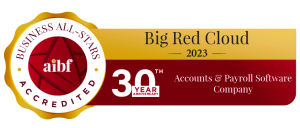When you’re running a business, although you know that efficient and accurate bookkeeping is essential, it can be hard to prioritise the paperwork over making sales and delivering your service or product. Yet at the back of your mind you know that the books have to be done – it’s a small but constant background stress for many business owners.
A large company will probably have an in-house bookkeeper with formal training and relevant experience looking after this work and while that may be the ideal scenario for a small business, it’s not a cost-effective or practical solution where there may only be a few employees and cash-flow is tight.
Cut the Stress – Sort Your Bookkeeping Process
If you’ve been putting this issue on the long-finger, the good news is that you don’t have to be into it to sort it .It may not be the most exhilarating business activity you’ll undertake in your life and we’re not pretending that you’ll ever jump out of bed looking forward to doing the books but equally don’t make the mistake (or continue to make it!) of regarding it as the “Bogeyman in the wardrobe” that no one wants to confront.
Like everything in business, you need to commit yourself to finding an effective process and take a little time out to organise things. When it comes to implementing an effective book-keeping system, not only will you relieve your mind of the background noise(!) you will also enjoy all the benefits of running a tight ship on the bookkeeping front. Just think about that – you can easily change this “headache” into a real business benefit. And the great news is that an effective accounting system is easily achievable.
Once some basic procedures are adhered to, it should be a simple process to maintain an efficient and accurate bookkeeping system. Just make it part of your routine on a daily basis and before you know it, it’ll be a comfortable habit that makes you realise you are on top of things in your business – that’s a good feeling! Here are a few helpful tips and guidelines
1. Test Drive a Bookkeeping Software System for Free
You can choose to do the books yourself or it is feasible to get someone to do them for you – often some-one looking for flexible working hours is ideal and a self-employed book-keeper can be relatively in-expensive and good value if it frees you up to concentrate on growing the business. Equally you can get to grips with the new softwares on the marketplace very easily now and they are great value so why not take a demo first then decide? Try Big Red Cloud accounting software for free.
2. Keep Daily Records
This is probably the most essential advice that can be given. Everyone has a different system. Develop one that suits you and that you are comfortable with. Take a few minutes out every day to record transactions – when things are slow; this could be lunchtime for professional services or the first thing in the morning for retailers, inputting the previous day’s transactions. What is important is that you have one and that you use it. This is absolutely essential. It is the only effective way of monitoring the financial condition of your company.
When you have an organised and efficient system of keeping records it should only take a few minutes every day to keep records. Daily records are the cornerstone of any good bookkeeping system.
3. Entering Invoices
It is imperative that there is a set time set aside to enter invoices. The volume of invoices can differ between businesses but devote as much time as you need to enter them, it shouldn’t really take that long. This should never be approached in an ad hoc fashion. Use software that will make this as easy as possible to do. Big Red Cloud’s cloud accounting software is ideal for this.
4. Take a Clear Look at your Cash Flow
Most small businesses feel restricted due to Cash flow constraints but good book-keeping can help you keep on top of this, giving you instant access to statements, identifying payments due, payments over-due etc. By using a system that is accessible from any location e.g. from the office, factory, retail outlet or from home, you can have instant access to this information and get on the phone straight away where necessary!
This access is achieved easily by using online cloud bookkeeping software. By monitoring cash flow you can take action and also avoid unnecessary squeezes, stress and the charges that come from having insufficient funds.
5. Follow Up on Recurring Slow Payers
Not only will good bookkeeping help you stay on top of things on a day-to-day basis, it will also highlight trends and longer term patterns. For example if a client is consistently slow to pay, rather than discussing this in general terms with him/her, you will be able to present an accounts receivable report for that client specifically so that new payment terms can be negotiated going forward. This is just better business for your enterprise and less worry for you going forward.
It’s easy to get bogged down just by the thought of doing the books but once you have a good platform and a simple process in place – not only will your business benefit but you’ll also have the peace-of-mind of knowing that the books are sorted. Who knows – you might even enjoy the bookkeeping process!





